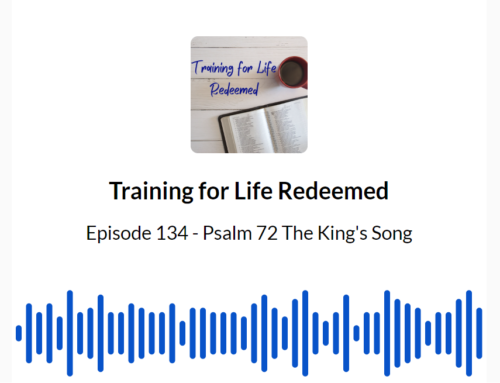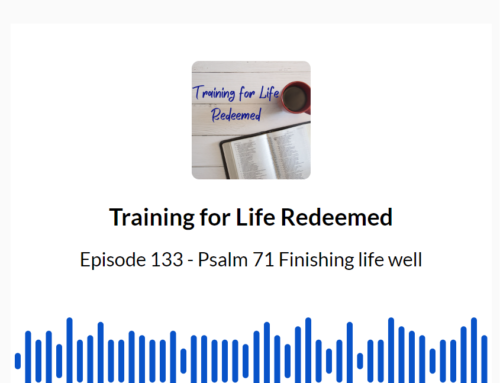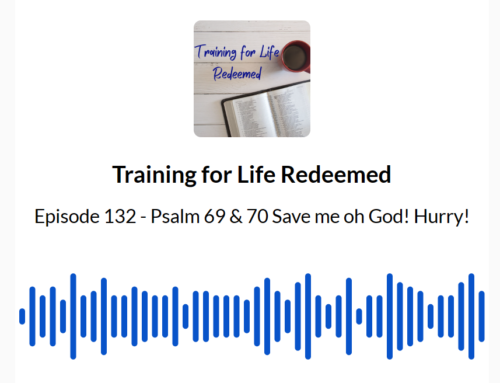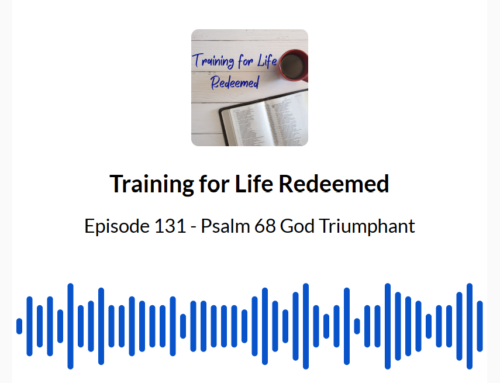Job’s faith is proven to be genuine, but at great cost. Is there injustice here? As Job screams, is he turning away from the Lord?
Grab your notes for this episode by completing the form
and we will send you the link to all our notes.
Transcript
Dan:
Hi, everyone. And welcome to trainingforliferedeemed. I’m your host, Dan, and as always. I am with my father, David Jackson, and we are today looking at Job chapters one to four, and the charge that gets laid against Job. So dad, right at the beginning here, Job gets declared very clearly that he is blameless. That is, is he really a blameless bloke? Is he really that good?
David:
Yeah, he’s as good as me and you, I hope. He is a blameless man. The word means that there is nothing , on his charge sheet. He’s guilty of nothing. the slate is clean and he is , God goes on to say that not only is he a blameless man, so he’s innocent of all charges, but he is choosing to live out who he is. So who he is before God is one thing that’s his legal status is innocent of all charges, but then Job believes what you would call a straight life. He’s going straight. and he’s choosing constantly to turn away from all the wicked choices that a person can be tempted to do. So, you know , he may not be a hundred percent successful in making those choices, but that’s the general statement of his lifestyle
Dan:
He’s not sinless.
David:
Well, he, yeah. he does, this is the whole thing for, for me, and you, being a Christian, right? My standing before God, is that Jesus paid it all. There’s nothing owing. I am clean. I am blameless. I am spotless. I’m righteous. Doesn’t mean that’s how I behave. So what I’ve got to do as a Christian is I’ve got to go from what Jesus has done for me to take away all of my sin and guilt, and then to turn around and live a redeemed lifestyle that reflects who I am in Christ and Job is a man Who’s doing a fairly good job of living out that lifestyle. But the essential thing is that God has declared him blameless. You know , here you go, go check out my mate Job. He’s blameless now that’s God’s word. I don’t think there’s, there’s no authority that can overrule that. So that for me as a Christian, that’s pretty exciting, but it’s hard to digest I think. And maybe that’s why we have this book of Job.
Dan:
Okay. So chapter one also begins in heaven. We have this scene where Satan comes into the heavenly courtroom or the heavenly throne room and is speaking to God, what is he doing in heaven? If he’s meant to be not. Yeah , he’s not on God’s side. So to speak , and what what’s going on?
David:
We know so little about this Satan character, the word Satan in Hebrew, it means your opponent. So if you oppose somebody, you satan them, and occasionally in the Bible, God is the one who opposes. So, you know , we’ve got to go back into God’s courtroom and this figure arrives. And we we’ve never heard of him before, but he clearly has a role in God’s court. And his role seems to be to prosecute. So I’ve called him the prosecutor. We could call him the adversary because when he charges God’s people with sin, it’s always going to be a lie. so he is known as the false accuser. And when that gets translated into Greek, the Greek word, diavolos the word we get devil from the Diavolos means slanderer. So here is the prosecutor, which is an office in God’s courtroom. now we assume that the guy occupying that office is the guy we know in the new Testament as the Devil, but he’s just called the prosecutor. the only other time he appears in the old Testament, t he prosecutor is in Zechariah when he accuses the high priest of being covered in sewerage, Ze chariah t hree. So he’s got a legitimate role in God’s court to bring the accusations, to investigate. So you see him wandering around the earth, checking people out. He’s the Royal investigator, the chief of police, if you like, but he’s the police prosecutor. And the problem is when God saves people, he’s got nothing to charge them with. So this becomes a test case
Dan:
Because it seems like in this scene, Satan’s coming into heaven, but then it’s God who raises Job as the test case. Isn’t i t. S o God says, have you considered my servant Job? And then the discussion happens here w hen Job says, well, he’s only following you because you’ve blessed him so much. And then God gives these permissions to Satan to go and take away Pretty much all the blessings that Job ever had. And Job ends up c overing t he sores on an ash heap is God being unjust by allowing this to happen to Job.
David:
It’s an interesting question because here’s where it really challenges us to rethink the way we do business God by his nature is the definition of what is just, if we put God down into our courtroom, this would be unjust. It doesn’t meet our standard of justice. So we get and the whole book of Job is g oing t o reveal that we get confused about this because we want to put God down into our courtroom and measure him against our idea of justice and our values. And God is God doesn’t answer that. So o ne o f the things that we we’ve got to grasp is, and God is going to teach us this at great length in Job. You don’t question me. I’m the creator. God, I’m the judge. You’re not the judge. So you’re going to get a lot of, a lot of talk going on in Job about if you want to put me put Yahweh in court and make him the accused, God, i sn’t entering that courtroom. He’s y ou k now, w e’re not going to play that game. I don’t have to prove God. I don’t have to justify God. He is God, he defines what justice is. So that being said, God’s going to turn around and say to the satan, you incited me to to chew Job u p, to swallow him for no reason. Now That puts the charge back on the prosecutor. But it also admits that what God is doing to Job is without any basis of justification in Job. Now , if we put that in our courtroom, that would be unjust. And it’s unfair that Job suffers. But if we put that back in the context of God, Job is on this planet to glorify God and God created him. God owns him. God can do what he likes with him. If that’s , because that is going to serve the glory of God and a greater purpose. Therefore, it’s just. So looking at it , is it, from our perspective with God in the dock or are we in the dock .
Dan:
So then when we come to chapter three and Job has this rather extended outburst about life or what he would like to have a lack of life. And the things he has to say is he starting to do the wrong thing? Is this okay for him to start doing this? If it’s, there’s no reason for, well, no , they’re just trying to word it properly . Cause I feel like there is a reason because it’s to glorify God, but there’s no reason within Job, but I guess for this to happen to him. So his outburst, is this, okay? Like it’s not the same as what he’s saying in chapter 1:21 and 2:10, where he’s saying praise the name of the Lord, h e’s blessed me. He’s t aken it away o r whatever. This is a bit more than that.
David:
Yeah . Yeah. So we like it. If people are preaching through Job and we’re doing devotions on Job, we all go to the, you know, the Lord gave the Lord, took away, blessed, be the name of the Lord. We don’t go so quickly to Job chapter two. Let me find it again. John, 2:10 , shall we indeed accept good from God and not accept evil now I don’t hear too many people having a devotion based on that verse. do we accept the fact that God, the word evil by the way means it’s just rotten or destructive. So God has the right to create, but he also has the right to destroy because it’s his. and Job just sits there and says to his wife, you know, he is the creator. He has the right to do this. I’m not going to question that that’s an extraordinary statement , accepting that God has the right to do it. Now that’s one thing. But now we go to chapter three and this is no light thing that God has done. So you stop and think, you know, a couple of years ago , your youngest brother fell off his bicycle. He broke his shoulder. He was on his way to work, but he fell off his bike. Cause there was a bus that went past him and knocked him over the person driving behind told me that the back wheel of the bus missed his head by two inches. Now , you know , the thought of losing my son youo know, coming that close to losing was that this guy lost 10 kids. Yeah . You don’t just sit there. Piously saying the Lord gave the Lord, took away blessed, be the name of the Lord in your head. You’re saying that, but down deep in, your gut you’re screaming. And so chapter three and four, we hear Job’s screen and he lets it out. And the thing that I I absolutely delight about those two chapters is that it’s okay for him to do that. When I wrote my book, I wanted to call it howling on God’s knee, howling on the Father’s knee. But , but Job, he’s raging. He’s boiling, he’s screaming. I like this, this, this little line that he tucked away in in some way. And it is my flesh. Bronze. Am I a rock? Am I not allowed to scream in pain when this stuff happens? And the answer from heaven is clearly go for it, let it out. And that’s wonderful, but it , it is he’s in a terrible place. You think, you know, here’s a man who says it would have been better if I’d never been born, then I wouldn’t have experienced this kind of a loss. And I think every believer who has ever encountered death and suffering understands what Job is saying here. But it said in a context that says, God has the right to do it. But man at hurts , I like that the fact that both can be true.
Dan:
Thank you so much. That brings us to the end of this episode. So if you’re listening and you would like to get the transcript or watch the video, et cetera , grabbed the study notes to go with this session, please head over to trainingforliferedeem .com/ 49. You can grab the study notes there. If you enjoyed the episode, please leave a review and make sure that you subscribe and come back and join us next week. As we look at Job chapters, four to seven and we have elephants come in and the discussion from the opposition really starts to happen.



